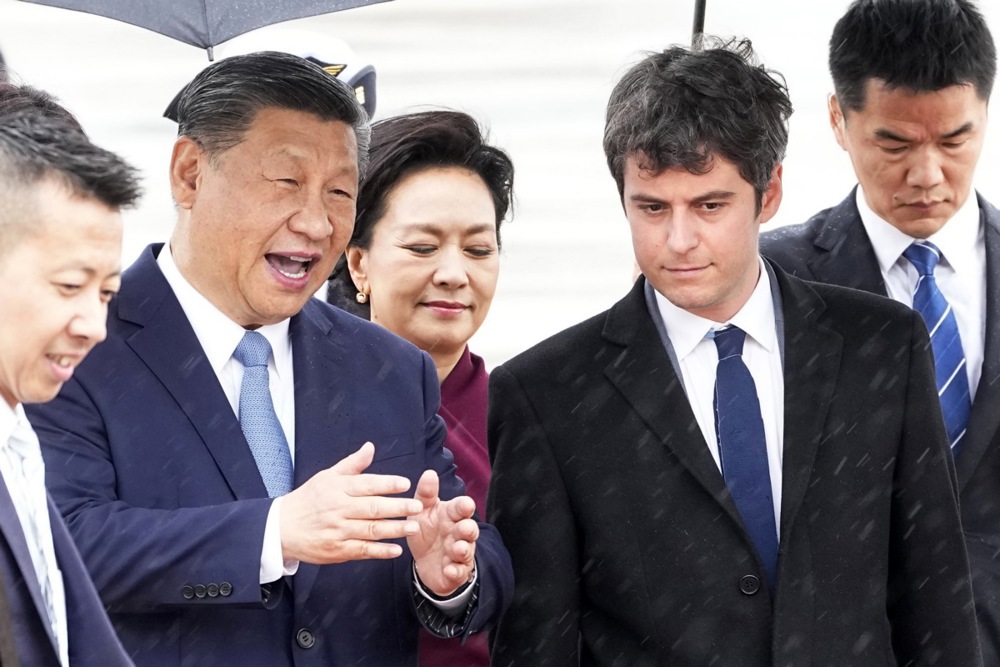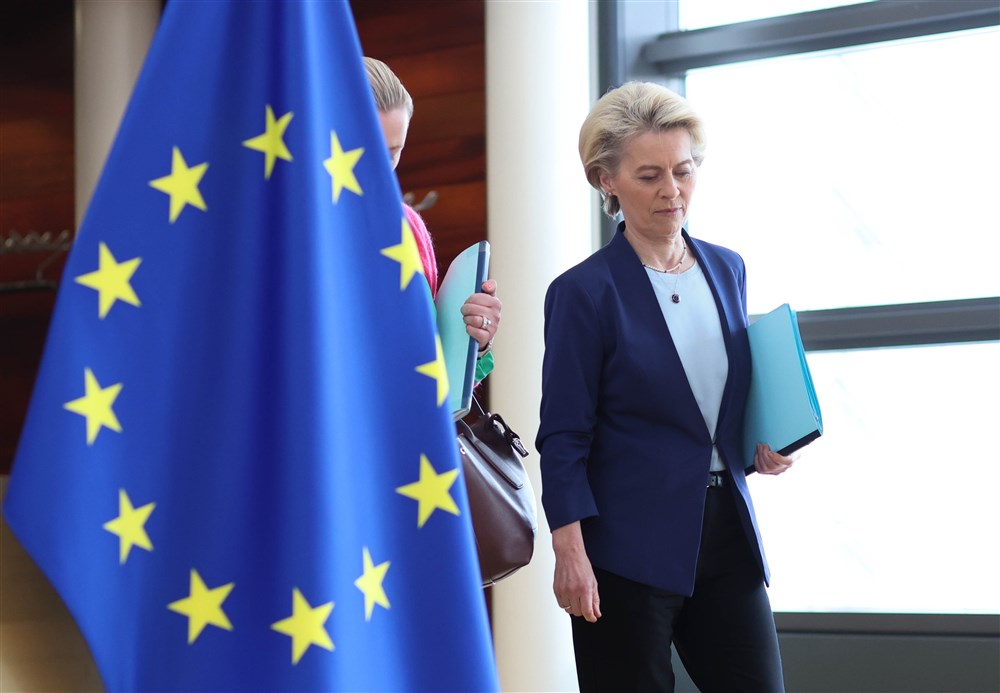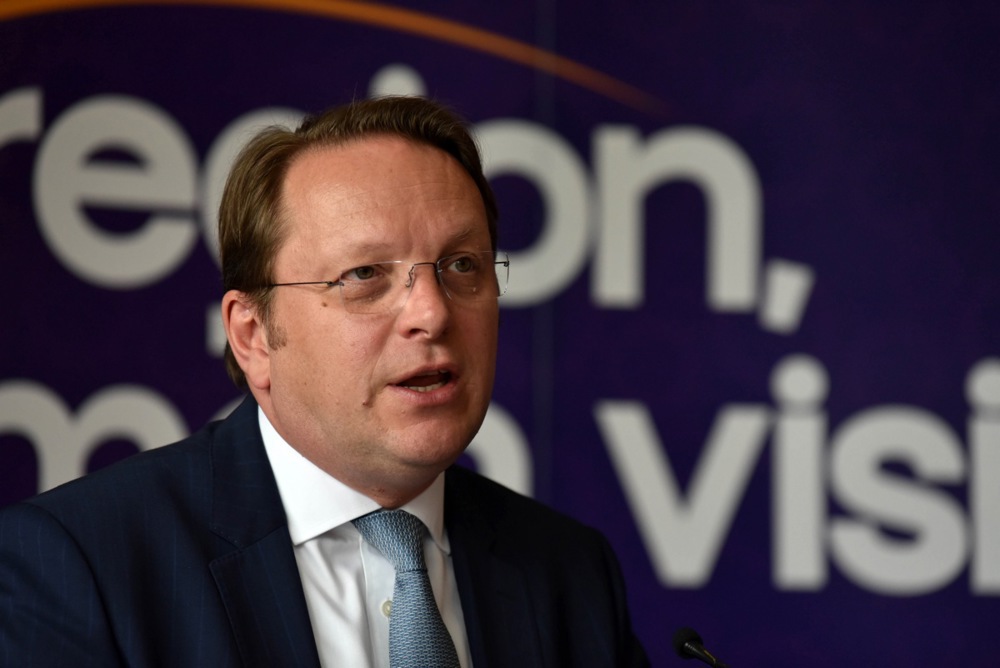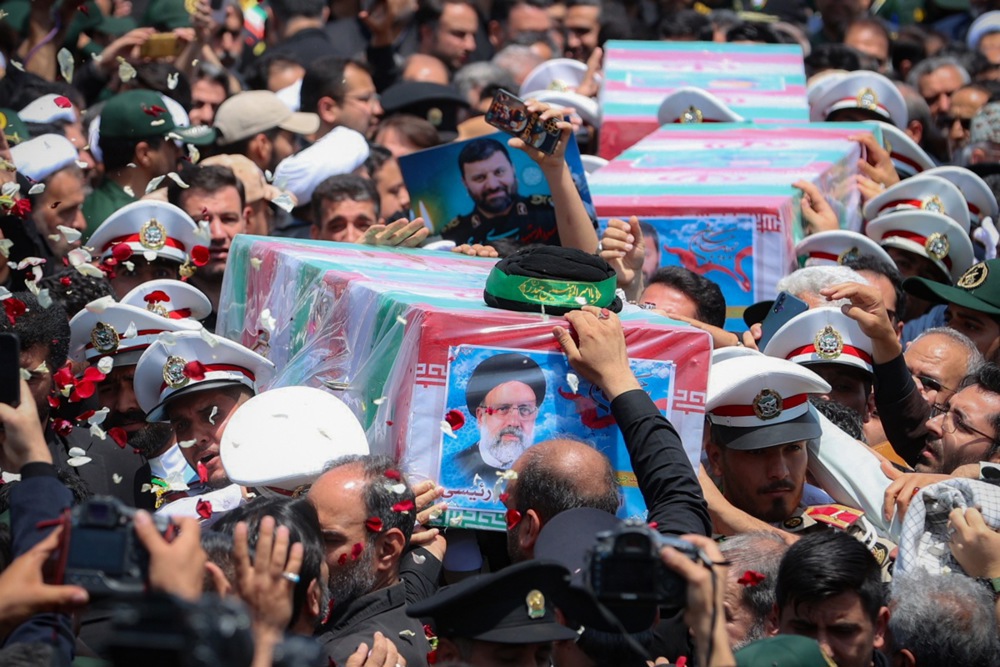Everything seems to indicate that the French party National Rally (RN), effectively led by Marine Le Pen, is going to sweep the board at the European Parliament elections, set to take place June 6-9.
A few days before the vote, Brussels Signal spoke exclusively with Malika Sorel, one of the party’s main MEP candidates and possibly its most outspoken regarding immigration. It is her first-ever international interview on the EU elections.
Of Algerian origin and Marseille-born, Sorel talked about what she sees as the risks of non-integration in European societies and about what she believes Europe must do to regain its position in the world.
She was advisor to Prime Minister François Fillon on educational and immigration issues, during the 2017 presidential election.
Sorel, who is also a writer, also spoke about the uncertain future of her country, France’s potential to be the political leader of Europe, and a possible third world war.
1) Your party is tipped as one of the possible winners of the 2024 European elections. What do you think is the reason for the support that the French public gives you?
A large number of citizens note with dismay the results of the policies that have been implemented. The French were promised a European Union that would make Europe a powerful continent, which would shine throughout the world and protect the European peoples.
[Yet] poverty is increasing in most of the founding countries of the European Union, businesses are going bankrupt, and unemployment is increasing for the most vulnerable. [It is] a continent which is also changing, dramatically in terms of culture due to the migratory flows.
As I show in my books, European institutions have played a deleterious role in this immigration subject.
We also promised peace forever and prosperity for all, and now war is returning to the gates of Europe, not to mention the civil unrest, which is growing within all European countries, without any exception. The French, by expressing their desire to vote for our list, indicate that they want a change of course — of direction.
In terms of French domestic policy, there are many failures and few successes to be credited to those in power in many areas. France’s debt has exploded. Standard & Poor’s agency has just downgraded our debt rating. Health services are deteriorating.
Insecurity is spreading across the entire territory, and the level of this insecurity is of great concern to the French because they have the feeling that everyone can, one day or another, find themselves a victim of violence. Immigration is not at all controlled.
The State no longer seems to have any authority. It constantly gives the impression of having lost control of the situation. At the same time, there is a denial of the seriousness of this situation.

Members of the government do not want to admit the reality of the problems that the French encounter in their daily lives. There is also a specific rejection of [French] President Emmanuel Macron, who appears to be a president who despises the common people.
We are in a dangerous situation of strong distrust of the people towards their elites. Many citizens also hope for a change in domestic politics.
2) In recent weeks, Macron has appeared in various media outlets such as The Economist trying to look like a continental leader, with Germany in the doldrums. Can the current President exercise such leadership? What is your party’s opinion on him being at the head of the Élysée?
It is impossible to exercise leadership through words alone. Leadership thrives on tangible results. The President has been there for seven years. However, his results are bad.
You are strong and powerful when you have demonstrated that you are capable of improving the situation of your own country; when you have a very large army, when you possess technologies that other countries need and you are one of the only ones who hold, or when others depend on you for their food and health, medicines or vaccines.
You can also exercise or claim leadership when your own society is itself strong, united and peaceful, and not disunited and prone to violence, as French society is currently. The best proof that the President has failed to exercise leadership is that he is not listened to, neither on the European scene, nor on the international scene. He makes demands but no one listens or follows him.
3) You are one of the strongest anti-immigration figures in the RN party: What do you see as France’s position?
I worked within the High Council for Integration where I was appointed by [then-]president Nicolas Sarkozy. What I was then able to observe is that all societies in the European Union are facing the same serious problems and that these societies are no longer able to create the conditions for peaceful cohabitation.
Instead of learning wise lessons from this, the governments of the various countries of the European Union continued to let in large numbers of immigrants.
When there is such a problem, we think do think about it. We are not stubborn. However, the European Union is stubborn and therefore puts the destiny of Europe in danger.
We are facing a serious denial of democracy because the elites are working here against their own people. This is a fact. It is as if parents who had failed to create a climate of serenity between brothers and sisters, and even had created a climate of permanent tension, continued to adopt new children.
This is total irresponsibility because people could end up revolting in the face of this denial of democracy.
Like other Europeans, the French are opposed to continued immigration because they see that cultural integration is becoming more and more difficult and has even failed for a far from negligible number. Everywhere, we see a clear deterioration of cultural integration over time. In fact, the first generations of immigrants integrated much better with the host people.
Despite the difficulties of “living together” and despite mass unemployment, the French State, as well as others, are in favour of immigration and continue to leave France’s doors and windows open.
In France, among migrants and their descendants, the unemployment rate is double that of the rest of the population. Even when people enter the country illegally, there are very few returns to the countries of origin.
This is unacceptable.
4) Le Pen recently spoke on Franceinfo of the need to strengthen borders, including within the Schengen area. Is this related to what you just said about European immigration policy endangering the survival of Europe?
Yes, clearly. I have explained this in all the books I have published and I have said how the behaviour of Europeans, who do not respect themselves, could only fuel the contempt that fuels violence against themselves.
To have any hope of being respected, you must stand up for yourself and respect your own habits and customs inherited from a long past, from a political and cultural history, and not prostrate yourself as the Europeans do.
Westerners appear as weak people, isolated from each other, only concerned with thinking about their immediate well-being and not at all sufficiently concerned about their collective destiny.

The great thinker Alexis de Tocqueville warned of this terrible fragility of citizens of democracies. It is necessary to reread On Democracy in America, in particular volume II. Everything is said there.
In a relationship, we must know how to take into account the culture of the sender but also the receiver, always questioning ourselves to know how our own attitude can be interpreted by other cultures.
Westerners do not do this work and thus put themselves in a position of vulnerability.
5) The European group ID, of which you are a part, seems to be going through critical moments just before the elections. Was this the best time to break with the [German] AfD party?
The AfD strategy and that of Reconquête in France are totally counterproductive and I would even say toxic in many respects. Indeed, if Europe is now in a situation which puts its own survival in danger, as a civilisation, it is primarily due to the fault of Europeans of Western origin.
Migrants and their descendants are only seizing the opportunities given to them to disrespect European cultural heritage on European soil.
Today, we are faced with a situation where children of immigration, like me and many others, are committed to the West when Westerners betray the West and work to destroy it. The approach based on ethnicity, race and religion is not the right one.
The line must pass between those who defend the survival of the West and those who work to weaken and destroy it.
As the philosopher John Locke famously said: “The actions of men are the best interpreters of their thoughts.” We must therefore judge men and women by what they do and not by their birth.
This is how we will succeed in bringing together all those who want to save a Europe in very bad shape, which is probably going through the greatest crisis it has ever had to go through, since its survival is now at stake.
I am an intellectual who got involved in politics to ensure that Europe does not disappear and then is reborn and becomes strong and powerful again. I am immensely attached to the Western civilisation that I have made my own and find it unacceptable that Europeans could have allowed what is happening.
History, I have no doubt, will judge our era very harshly. A start is necessary!
6) Is there a possibility of an alliance between The European Conservatives and Reformists (ECR) and ID to obtain more power in the European Parliament?
These questions will be decided the day after the June 9 election by the leaders of the different parties. The most important thing to keep in mind is that it is fundamental to force the European Union to change direction to respect all the peoples and nations that make it up.
Current institutions are in a headlong rush. We see this on the question of enlargements about which we do not tell the truth to Europeans, nor on the costs of these endless enlargements, nor on the fragility that this introduces, nor on the competition between Europeans.
No reasonable mason would erect walls until the foundations were solid. But this is exactly what is being done with European construction. No lessons are learned from the dysfunctions and even less from the state of fragility in which the Union finds itself today.
The urgency is therefore to unite all the people of goodwill who intend to put an end to the profoundly unreasonable policy pursued by [European Commission President] Ursula Von Der Leyen and her supporters. One example among others: The planned reform of institutions which intends to deprive each country of its right of veto. It’s the end of sovereign nations!

I don’t know if, in other European countries, people have been informed of this institutional coup d’état that is being prepared, but here in France, the media are passing over this crucial subject in silence!
By June 10, it will be too late. Also, I hope for an awakening of European citizens so that they allow us to redesign [the European] Parliament and thus better serve and respect the interests of the European peoples.
Over the years, and thanks to each crisis, states have found themselves progressively dispossessed of the levers of their sovereignty. Many issues must once again be resolved at the most efficient level and with respect for the identities of peoples, as provided for by the principle of subsidiarity.
The European Union must add the strengths of the nations that make it up and not subtract them.
7) Le Pen is very critical of Macron’s foreign policy regarding the war in Ukraine. Is France right to lead the European escalation against Russia?
I make a distinction between France and the French State because, on many issues, the president is isolated. On this point, he does not represent the voice of the French who oppose his own.
The vast majority of French people reject escalation and hope for de-escalation. They would like France to rediscover the role it has played many times in history, namely that of a nation which works for peace and the rapprochement of peoples and not for war. We had a great tradition of diplomacy.
In 2003, we were proud to see [former French prime minister] Dominique de Villepin, for whom I worked, refusing that Europe could launch a war against the Arab-Muslim world through Iraq, and thus destabilise an entire part of the world. The Americans and some of their allies did not want to listen.
The result? We are still paying today for this fatal and dramatic error.
There have been so many deaths, displaced people, and above all, a lot of hatred and resentment which have accumulated against a West which appears quick to humiliate the rest of the world.
8) Are you in favour of sending French troops to Ukraine? Is that needed right now?
I have long participated in the work of a geopolitical and defence association alongside diplomats and soldiers. Sending ground troops to Ukraine would automatically make us belligerents with all the risks that this poses for Europe, because France and Russia hold nuclear weapons.
Let men think again of the horror of which Hiroshima and Nagasaki were victims, and this will hopefully make them take the path of moderation, wisdom and reason.
Even during the Cold War, the world was filled with the feeling that the actors involved knew how to keep their cool. Today, anxiety is at its peak because there is the feeling that everyone can lose control of their nerves and do the irremediable.
I believe that those in power have not done everything possible to stop the bloodshed for the moment. War is a calamity. Most often, it is the people who suffer, and not the elites, who continue to live well, protected from misfortune.
Europe has experienced many wars and, here too, has clearly not learned the lessons. One day, the earth can no longer absorb the bloodshed and men end up sitting around the table to sign peace treaties.
Scars remain forever, which sometimes do not heal and fuel hatred and resentment. Why make the same mistakes again?
9) There is more and more talk of a third world war — do you think this is a possibility and, if so, what role should Europe play?
Yes, this war is possible, and the concept of the Global South outlines its contours. A major difficulty for Western countries is that their societies are no longer unified but deeply divided.
Due to uncontrolled immigration and the failure of cultural integration for a significant number of people, we have, in each European country, groups whose hearts beat with their country of origin, especially from the global South.
Through this, the European peoples were dispossessed, by their elites, of their sovereignty and, in my opinion, this is a betrayal which has no precedent in the history of Europe.
We must work on several fronts and in several directions. Everything must be done simultaneously.
I will give some examples here. Europe must become a power again. If you are powerful, you will be less easily attacked. It is on the principle of deterrence. Rearmament must be moral, economic and military.
The European Union must stop weakening the minds of the European people and it must also stop hindering the emergence of economic champions.
When our companies had the right to create strong alliances between them, it gave birth to magnificent projects which created wealth but also gave Europeans the pride of being Europeans.
But the European Union has long been guided by only one obsession, free and undistorted competition, which has led it to see our companies as enemies to be placed under surveillance.
Europe is working against itself, and we have seen this clearly through the punitive Green Deal or the ban on thermal [fossil-fuel vehicle] engines by 2035, thus playing into the hands of Chinese electric cars. The European Union has been culpably naive in this wild globalisation.
In any crisis, the feeling of pride and self-confidence is a decisive asset and even more so in a situation of danger. It is urgent to work to restore the pride of Europeans. We are once again plunged into a dangerous and unpredictable world which can flare up at any time on a certain number of subjects.
It is also essential to strictly regulate immigration, so as not to further weaken the cohesion of nations.

We must stop giving nationality to people who do not share the principles and values of European societies. A nationality is also a title to land, hence introducing the possibility of a major territorial conflict in the long term.
We must also stop sucking the brains of certain countries of the Global South because this impoverishes them and leads, in the process, to immigration of the poorest because their country loses all prospect of development and enrichment.
It should be noted that this pillaging of the brains of the South, including doctors, by European countries, is currently used as an argument by religious fundamentalists to increase hatred against Europe and Europeans, therefore the possibility of attacks on European soil. We are losing across the board.
It is also necessary to move away from Western paternalism and deal with the countries of the Global South in an adult manner. Every trade agreement must be win-win for the parties involved.
European leaders must also, for their part, stop believing that their countries are so rich that they can still afford the luxury of canceling others’ debts or distributing money all over the place, even though their own nationals are plunging, some, into poverty.
It is essential that Europeans stop wanting to impose their own cultural identity or even immigration errors on other peoples. When I see European Union campaigns wanting to impose gender theories on Maghreb countries or even the inconsiderate reception of mass immigration from Africa, I know to what extent this interference sows the seeds of hatred against Europe in these countries.
Europe can become a continent linking several cultural blocs. On condition also, that it becomes autonomous again and that it is no longer systematically aligned with the United States, which is very poorly perceived in several regions of the globe due to its past wars.
Europe must relearn how to defend its own interests, which it no longer does much. But nothing will be possible if Europe persists in not respecting its own cultural and civilisational heritage and its determined transmission to younger generations.
This also involves plans to boost the birth rate throughout Europe. After the First World War, the birth rate picked up again. There is no final fatality. Today, we must also stop worrying our young people about the climate and insecurity because this greatly contributes to the fact that they are afraid of giving birth.
But a people who do not give birth are a people condemned to die.
The disappearance of Western civilization in Europe would be a tragedy for all humanity. This is the basis of my commitment to politics: to participate in preventing this absolute tragedy.
It’s my way of giving back to France and the West all the love and freedom they gave me.





